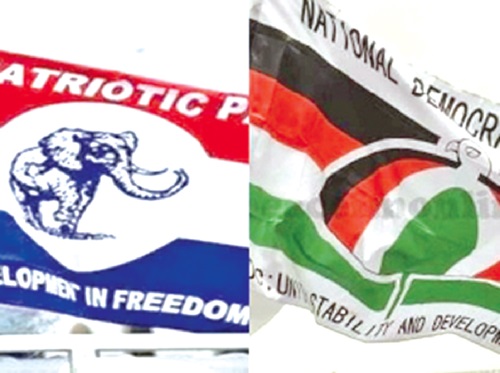It is not uncommon to hear, expressed with frustration, the statement “everything is turned into NDC-NPP” whenever national issues are discussed.
This statement reflects a growing concern about deepening political polarisation in Ghana.
It is a legitimate worry if no national issue is spared from political polarisation.
But for our democracy to continue to mature and remain resilient in the face of the strong winds of political polarisation, there must be a partisan consensus on certain core principles.
For answers, I turn to the Afrobarometer survey (Round 10, 2024) and discuss five democratic principles and how partisans, those who say “they feel close to a political party”, answered survey questions related to these principles.
Support for democracy
First, partisans consistently express support for democracy- 75 per cent of them say that “democracy is preferable to any other form of government.”
![]()
President John Mahama (left) and Dr Muhamudu Bawwumia, former Vice-President, signing a peace pact ahead of the 2024 general election
The commitment to Ghana’s democracy and civilian rule is further captured in their response to what happens “if the military were ever to intervene in government”, where 83 per cent support an “immediate/gradual” return to civil rule.
The commitment of partisans to Ghana’s democratic project is assured.
Second, partisans support the use of elections to choose leaders.
As many as nine out of 10 (85 per cent) believe “we should choose our leaders in this country through regular, open and honest elections.”
It is reassuring, given the tensions observed during elections and the mistrust of the Electoral Commission, expressed by parties, especially when in opposition.
Third, partisans believe in checks on the Executive despite the often-expressed sentiment that the Ghanaian Constitution has by design to created a strong presidency – a) 78 per cent say “the President must always obey the laws and the courts, even if [he] thinks they are wrong”; b) 77 per cent agree that “members of parliament represent the people; therefore, they should make laws for this country, even if the President does not agree”; and c) 81per cent agree that “Parliament should ensure that the President explains to it on a regular basis how [his] government spends taxpayers’ money.”
Power change
Fourth, among partisans, 65 per cent agree that “in a democracy, it is better if power sometimes changes hands in elections from one political party to another” compared to 34 per cent who agree that “in a democracy, as long as a government is elected by the people in a free and fair election, it doesn’t matter if one party always wins and continuously governs the country.”
Perhaps, it is the opportunity to also hold power that drives this partisan shared belief for political turnover. However, fully aware of the consequences of political entrenchment, it is refreshing to see partisans express support for regular turnover.
Fifth, there is support for media freedom among partisans.
As many as seven out of 10 (71 per cent) agree that “the media should have the right to publish any views and ideas without government control” compared to three out of 10 (25 per cent) who agree that “the government should have the right to prevent the media from publishing things that it disapproves of.”
Fully aware that the media may publish views and ideas at odds with their partisan positions, this level of support for media freedom is refreshing.
More importantly, it enables the media to play its safeguard role.
Partisan acrimony?
If partisans share these core democratic beliefs, why then do we regularly observe partisan acrimony?
It boils down, in my opinion, to the perverse incentives of politics.
It is the kind of politics that rewards loyalty to political parties and eschews any form of bipartisan consensus on issues beyond these shared common democratic beliefs.
It is, therefore, easy to share a common belief about the importance of party turnover in a democracy.
What is more difficult is whether that turnover is politically deployed in a way that builds consensus and reduces political acrimony.
The other perverse incentive comes with regular competitive elections and the desire by political parties to hold on to power or regain it once lost.
In such an environment, political discourse is shaped by entrenched partisan positions without regard to its consequences for shared democratic beliefs.
Glimmer of hope?
Recently, though, I was asked to rethink my position on this subject when a colleague said, “Perhaps the situation we are dealing with is not growing partisanship where everyone is becoming NDC or NPP, but rather, deepening polarisation among those who self-identify as partisan.”
This is a valid point. A close look at the results from the Afrobarometer survey shows that the percentage of Ghanaians who describe themselves as “feeling close to a political party” has dropped significantly from 67 per cent in Round 1 (1999) to 45 per cent in Round 10 (2024).
Perhaps, further loosening of attachments to political parties will help translate our shared democratic beliefs into how we practice democratic politics?
The writer is the Project Director, Democracy Project.

